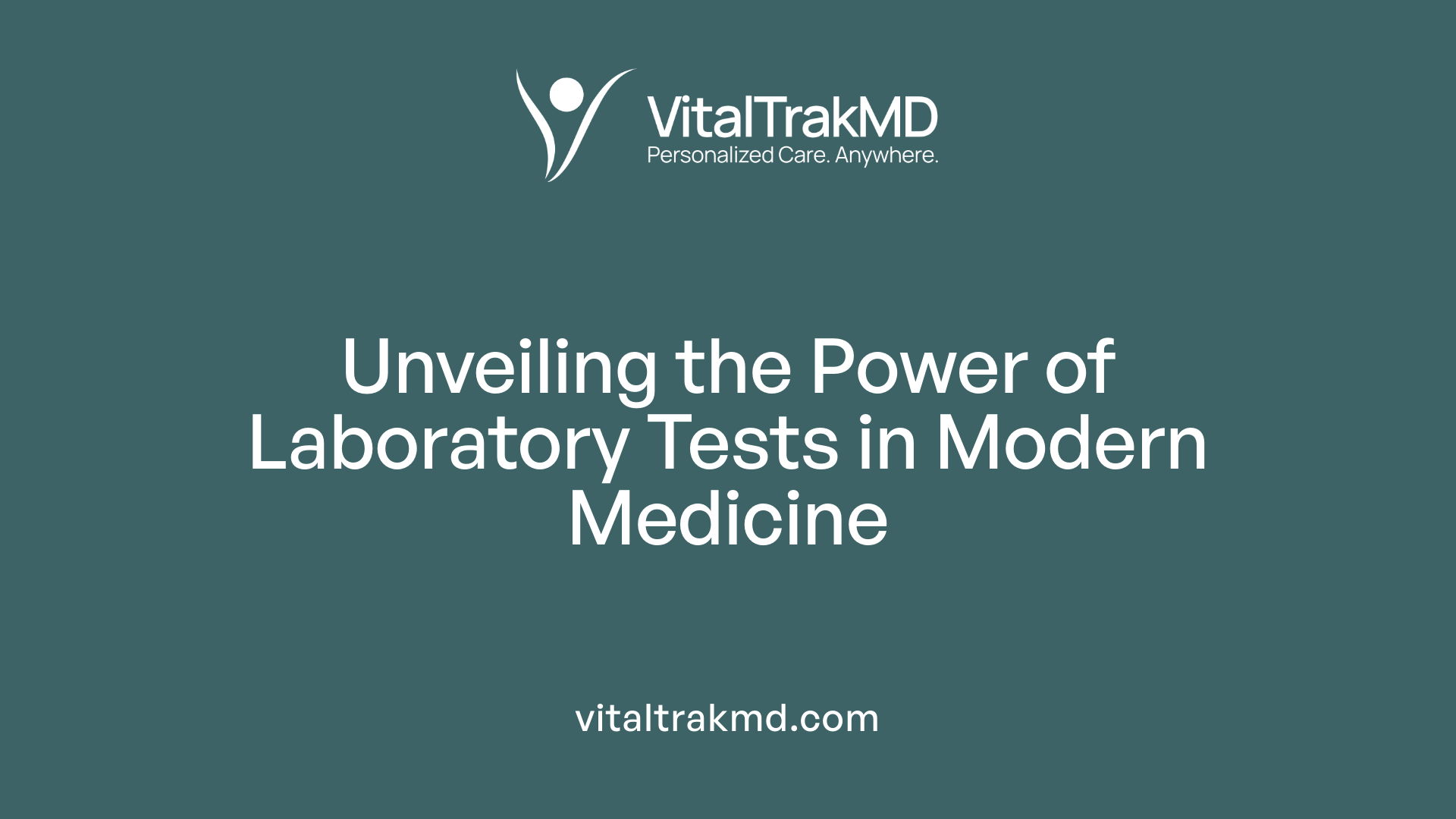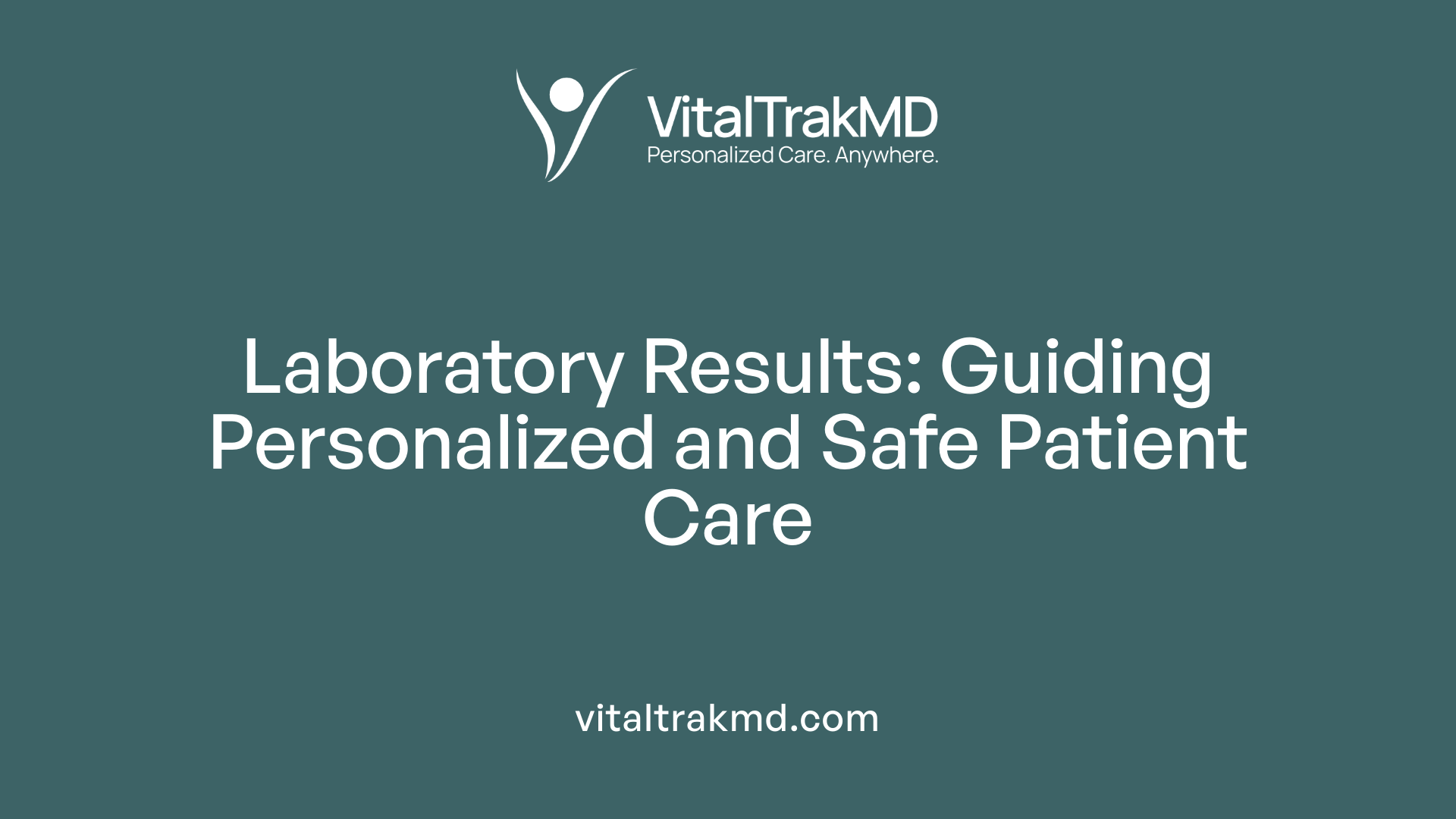Why Regular Labs Are Crucial for Medication Adjustments

The Critical Role of Routine Laboratory Tests in Medical Practice
Regular laboratory testing is a cornerstone of modern healthcare, enabling accurate diagnosis, personalized treatment, and effective management of chronic conditions. These tests provide essential insights that guide clinicians in making informed decisions about medication adjustments and overall patient care, ensuring safety and efficacy in treatment plans.
Understanding the Function of Laboratory Tests in Medicine

What is the role of lab tests in medicine?
Laboratory tests are fundamental to modern medicine, playing a vital role in the early detection, diagnosis, and monitoring of diseases. They provide healthcare providers with critical information about a patient's health status, such as organ function and presence of infections, facilitating prompt and targeted treatment.
Approximately 60 to 70 percent of clinical decisions regarding diagnosis, treatment, and hospital admission rely on lab results. Routine lab testing supports preventive healthcare, helps identify health issues before symptoms appear, and guides ongoing management of chronic conditions. Overall, lab tests are an essential tool that underpins effective and efficient patient care across various medical settings.
Why is routine blood work important?
Routine blood work offers a comprehensive overview of your overall health, making it a cornerstone of preventative healthcare. By measuring blood cell counts, organ function markers, and nutrient levels, blood tests can reveal potential health problems early, sometimes even before symptoms manifest.
These tests can identify conditions such as anemia, high cholesterol, diabetes, liver issues, and certain cancers. Early detection through routine testing allows for prompt treatment, which can significantly improve health outcomes.
Furthermore, regular blood tests are crucial for monitoring chronic diseases like diabetes and hypertension. They help evaluate how well treatments are working and whether medications need to be adjusted. Blood work also provides insights into nutritional deficiencies and organ health, guiding lifestyle modifications that support overall well-being.
Consistent blood testing not only aids in early disease detection but also empowers individuals and healthcare providers to make informed decisions about lifestyle, diet, and treatment strategies. This proactive approach enhances health management, helps prevent complications, and supports long-term health and vitality.
Types of common laboratory tests and their purposes
| Test Type | What It Measures | Why It’s Important | Typical Use Cases |
|---|---|---|---|
| Complete Blood Count (CBC) | Blood cells, hemoglobin, hematocrit | Detect anemia, infections, blood cancers | Routine check-ups, anemia screening, infection detection |
| Lipid Panel | Cholesterol levels (LDL, HDL, triglycerides) | Assess cardiovascular risk | Heart disease risk assessment, lipid management |
| Comprehensive Metabolic Panel (CMP) | Blood sugar, electrolytes, kidney and liver function | Evaluate overall metabolic health | Screening for kidney and liver disease, diabetes monitoring |
| Blood Sugar Test | Glucose levels | Diagnose and monitor diabetes | Diabetes management, fasting blood sugar |
| Thyroid Panel | Thyroid hormone levels | Detect thyroid disorders | Hyperthyroidism, hypothyroidism screening |
| Liver and Kidney Function Tests | Enzymes, waste products | Assess organ health | Monitoring chronic disease, medication side effects |
Monitoring ongoing health and medication safety
Regular lab testing is also essential after starting new medications. It helps evaluate how the body responds, ensuring medications are effective and safe. For example, drugs like blood thinners, statins, diabetes medications, and mental health drugs all require routine blood checks.
Blood tests can reveal side effects such as liver enzyme elevation, kidney stress, or electrolyte imbalances. They also help determine if medication dosages need adjustment or if a different treatment approach is necessary.
The optimal frequency of testing varies based on individual health status, medication type, and risk factors. Initially, more frequent testing ensures safety, then gradually lessens once treatment is well-tolerated.
The significance of blood tests in detecting and managing diseases
Blood tests are invaluable in catching serious health issues early, often before symptoms appear. Conditions like diabetes, heart disease, high cholesterol, and certain cancers can be diagnosed through blood work.
For chronic illnesses such as hypertension or thyroid disorders, regular monitoring helps tailor treatments to the patient’s evolving needs. Detecting disease progression early enables prompt interventions that can prevent worsening health conditions.
In addition, blood tests support personalized healthcare by providing data to customize treatment plans. They also motivate lifestyle modifications, such as healthier eating, exercise, and stress management.
The role of laboratory medicine in overall wellness
Laboratory medicine extends beyond disease diagnosis; it promotes wellness by providing insights into nutritional status, organ function, and risk factors. These insights help individuals make informed lifestyle choices.
Choosing a reliable lab testing partner involves looking for comprehensive options, quick turnaround, confidentiality, and affordability. Regular testing and communication with healthcare providers foster proactive health management.
Future advancements and digital integration
Emerging technologies like AI and automation are anticipated to further improve lab testing accuracy, efficiency, and accessibility. These innovations will enable faster results, more precise diagnostics, and expanded screening capabilities, ultimately enhancing patient outcomes.
In conclusion, lab tests are a cornerstone of modern healthcare. They facilitate early detection, monitor ongoing health, guide treatments, and support preventive strategies. Regular blood work empowers both patients and healthcare providers to maintain optimal health and quickly respond to emerging health issues.
The Significance of Laboratory Results in Patient Care

Why are laboratory results important before treating a patient?
Laboratory results serve as a cornerstone in the initiation of healthcare treatment. They provide objective, detailed data that help doctors identify underlying or early-stage diseases that might not yet manifest noticeable symptoms. By analyzing blood, urine, or other specimens, clinicians can detect anomalies such as infections, organ impairments, nutritional deficiencies, or cellular irregularities.
This data guides the selection of appropriate therapies, ensures that interventions are safe, and helps prevent medication-related complications. For instance, abnormal liver or kidney function tests can warn about potential drug toxicity, prompting preemptive adjustments.
Moreover, lab results enable healthcare providers to monitor disease progression and evaluate treatment responsiveness over time. This ongoing assessment supports evidence-based, personalized treatment plans, ultimately leading to better health outcomes. The ability to diagnose accurately and adjust care early is fundamental to effective, proactive medicine.
How does ongoing health monitoring through lab tests benefit long-term medication use?
Regular laboratory testing during long-term medication regimens offers numerous advantages for maintaining health. These tests provide a comprehensive picture of a patient’s internal health status, allowing clinicians to track the effectiveness of ongoing treatments and detect emerging issues promptly.
For chronic conditions like diabetes, hypertension, or kidney disease, periodic lab examinations help monitor specific markers such as blood sugar, electrolyte levels, or organ function indicators. Early identification of adverse effects, such as liver enzyme elevation from statins or kidney stress from certain drugs, allows clinicians to modify dosages or switch medications before significant harm occurs.
Consistent monitoring also helps in assessing disease stability, guiding decision-making for lifestyle adjustments or therapy changes. It ensures medications continue to be safe and effective over time, reducing the risk of long-term complications.
However, challenges such as over-testing and inconsistent protocols can sometimes lead to unnecessary workload and resource use. Evidence-based guidelines are essential to optimize testing intervals and ensure targeted, efficient monitoring. Altogether, integrating routine lab assessments into long-term treatment strategies enhances personalized care, boosts safety, and improves overall health management.
Monitoring Chronic Conditions with Routine Labs

Why are regular labs necessary for managing chronic diseases?
For individuals living with chronic conditions such as diabetes, hypertension, or thyroid disorders, routine lab tests are an essential part of ongoing health management. These tests serve multiple purposes, including tracking disease progression, evaluating the effectiveness of treatments, and monitoring the function of vital organs like the kidneys and liver.
Regular laboratory assessments can detect early signs of complications that often develop silently, well before symptoms become evident. For example, an A1C test measures blood sugar levels over several months in diabetes patients, helping to refine treatment plans. Lipid panels evaluate cholesterol and lipid levels, guiding interventions to reduce cardiovascular risk. Kidney function tests, such as serum creatinine and estimated glomerular filtration rate (eGFR), help identify early signs of renal stress.
Consistent testing allows healthcare providers to tailor treatments more precisely, adjust medications, and implement lifestyle changes proactively. It also equips patients with detailed health data, promoting informed decisions about diet, exercise, and medication adherence. Furthermore, adherence to testing guidelines and timely interventions significantly reduces the risk of severe health issues, like stroke, heart attack, or kidney failure.
Overall, routine labs form the backbone of personalized, preventive healthcare, enabling early detection and safer management of chronic diseases.
Specific tests for diseases like diabetes, hypertension, and thyroid disorders
Different chronic conditions require targeted laboratory assessments. Here are some common tests used:
| Disease | Common Test | Purpose | Additional Notes |
|---|---|---|---|
| Diabetes | Blood Sugar Test, Glycated Hemoglobin (A1C) | Monitor blood glucose levels and long-term management | Regular testing helps adjust medications and prevent complications |
| Hypertension | Renal function tests, Electrolyte panels | Detect kidney involvement or electrolyte imbalances that can affect blood pressure | Ongoing monitoring guides treatment adjustments |
| Thyroid Disorders | Thyroid Panel (TSH, T3, T4) | Evaluate thyroid hormone levels to diagnose or manage hypo/hyperthyroidism | Frequent testing may be needed during medication changes |
Consistent testing ensures effective management, early detection of disease progression, and prevention of serious health issues.
Prevention of complications and early detection
Routine lab testing plays a vital role in preventing complications associated with chronic illnesses. Detecting changes in organ function — such as declining kidney performance or abnormal liver enzymes — allows for timely interventions.
Early identification of subtle shifts in blood glucose, cholesterol, or blood pressure can prevent heart attacks, strokes, or kidney failure. For example, high cholesterol levels identified through lipid profiles can lead to lifestyle modifications or medication adjustments to lower cardiovascular risk.
Furthermore, regular testing helps identify new health risks or co-morbidities early, enabling proactive management. It empowers patients to make informed, lifestyle-related decisions, such as diet or activity adjustments, to improve overall health.
The combination of regular blood work and clinical oversight forms a comprehensive approach to achieving better health outcomes and avoiding complications associated with poorly managed chronic diseases.
How do laboratory data and decision support tools contribute to safe medication adjustments?
Advances in healthcare technology have integrated decision support systems (CDS tools) with laboratory data to enhance medication safety. These systems utilize real-time test results, clinical guidelines, and patient information to guide physicians during prescribing and medication adjustments.
For instance, when a healthcare provider orders a medication like a statin or a diabetes drug, the system checks relevant lab results—such as liver enzymes or blood sugar levels—and alerts the clinician if values are abnormal. This immediate feedback helps prevent adverse effects, such as liver toxicity or hypoglycemia.
Decision support tools also assist in dosing adjustments by recommending appropriate levels based on lab findings. For example, if kidney function declines, dosing of renally-excreted medications can be safely reduced. These tools can flag potential drug interactions and contraindications, further ensuring patient safety.
Evidence indicates that clinical decision support increases proper medication prescribing and adherence to monitoring guidelines. Studies show a pooled risk ratio (RR) of 1.48 in improving prescription accuracy and monitoring practices, though the impact on reducing adverse drug events remains variable with a pooled RR of 0.69.
In summary, integrating laboratory data with decision support tools provides clinicians with critical insights, enabling safer medication management, personalized care, and better health outcomes. Proper implementation and ongoing evaluation of these systems are essential to maximize their benefits.
| Aspect | Benefit | Limitations |
|---|---|---|
| Real-time alerts | Improve prescription accuracy | Alert fatigue due to excessive notifications |
| Dosing recommendations | Tailor medication based on current health status | Dependence on accurate lab data |
| Interaction checks | Prevent adverse interactions | Possible false positives leading to unnecessary caution |
Incorporating these technological tools into healthcare systems promotes safer, more effective medication management, ultimately protecting patients and optimizing therapeutic results.
The Future of Laboratory Testing and Patient Safety

What is the role of lab tests in medicine?
Laboratory tests are a cornerstone of modern healthcare. They enable early detection of diseases, accurate diagnosis, and ongoing monitoring of health conditions. With these tests, healthcare providers gain vital insights into organ functions like the liver and kidneys, blood cell levels, cholesterol, blood sugar, and markers of inflammation.
Routine lab work forms the backbone of preventive care as well. It helps identify risk factors such as high cholesterol or prediabetes before symptoms even emerge, allowing for early intervention. This proactive approach not only improves health outcomes but also reduces long-term healthcare costs.
Most medical decisions—about diagnosis, treatment plans, or hospital admissions—depend heavily on lab results. Studies suggest that about 60 to 70 percent of clinical decisions are based on some form of laboratory testing. This highlights how integral lab tests are to accurate, effective patient care.
Technological advancements such as AI and automation
Looking ahead, innovations like artificial intelligence (AI) and automation are set to transform laboratory testing. AI algorithms can analyze complex data patterns faster and more accurately than ever before. They assist in interpreting results, identifying abnormalities, and predicting health risks based on blood and tissue analyses.
Automation streamlines laboratory workflows by enabling high-throughput sample processing, reducing human error, and delivering results more swiftly. Robotics can perform routine tests like blood counts and metabolic panels, freeing up laboratory personnel for more complex tasks.
Furthermore, integrating AI with electronic health records allows for real-time data sharing, enhancing clinician decision-making. AI-powered tools can flag abnormal results immediately and suggest follow-up testing or treatments, facilitating more timely responses.
Enhanced accuracy, efficiency, and accessibility
These technological enhancements promise to make lab testing more precise, efficient, and accessible. Accurate tests minimize false positives or negatives, leading to better diagnosis and treatment planning. Faster processing times mean patients receive results sooner, enabling quicker clinical decisions.
Expanding testing capabilities through portable and point-of-care devices increases access, especially in remote or underserved regions. These portable labs can perform essential tests on-site, reducing the need for hospital visits and improving healthcare reach.
High-quality automation also ensures consistency across testing labs, reducing variability and improving reliability of results. As technology advances, the cost of lab testing is expected to decrease, making regular health screening more affordable.
Impact on medication management and healthcare
Improved lab testing directly benefits medication management. Regular testing helps monitor how patients respond to medications, such as blood thinners, statins, or insulin. AI-powered analysis can recommend dosage adjustments or flag potential adverse effects, promoting safer, more effective treatments.
For example, in diabetes care, HbA1c tests track blood sugar control over months, guiding medication changes. AI can analyze these trends alongside other data points for personalized treatment plans.
Additionally, rapid and accurate testing supports better management of chronic illnesses, reducing complications like organ damage or cardiovascular events. It also enhances drug safety by promptly identifying side effects like liver stress or electrolyte imbalances.
Reducing medication errors and adverse events through advanced lab testing not only saves lives but also decreases healthcare costs.
Future outlook
As healthcare continues to evolve, the integration of AI and automation into laboratory testing will become more widespread. Experts anticipate further improvements in diagnostic precision, faster turnaround times, and broader testing access.
With ongoing research and development, these advancements will lead to smarter healthcare systems capable of personalized medicine, disease prevention, and early treatment interventions. The ultimate goal is a healthcare environment where early detection and safe medication management are seamlessly supported by cutting-edge laboratory technology, greatly enhancing patient safety and overall health outcomes.
The Essential Role of Regular Laboratory Monitoring in Healthcare
Regular and comprehensive laboratory testing is vital for ensuring safe, effective, and personalized medication management. It supports early diagnosis, ongoing monitoring, and tailored treatment adjustments, particularly crucial for managing chronic diseases and preventing complications. As technology advances, integrating innovative tools such as artificial intelligence will further enhance the precision and efficiency of lab testing, ultimately improving patient outcomes. Healthcare providers and patients alike benefit from a proactive approach to health management through routine lab assessments, underscoring their importance in modern medicine.
References
- Why Regular Lab Tests Matter for Your Health - Santiam Hospital
- The Importance of Blood Tests After Starting New Medications
- Stay Ahead of Your Health: The Power of Regular Lab Checks
- The Effect of Laboratory Test–Based Clinical Decision Support Tools ...
- The Importance of Routine Bloodwork: Why it is Essential for Your ...
- Importance of Regular Lab Tests: Your Health's Secret Weapon
- Lab Testing: A Crucial Tool in Treatment and Recovery
Recent articles
Want to Feel Better and Live Healthier?
Join hundreds of patients taking control of their health with personalized care that fits their life – not the other way around.
Rated 4.8/5 by 32+ customers







